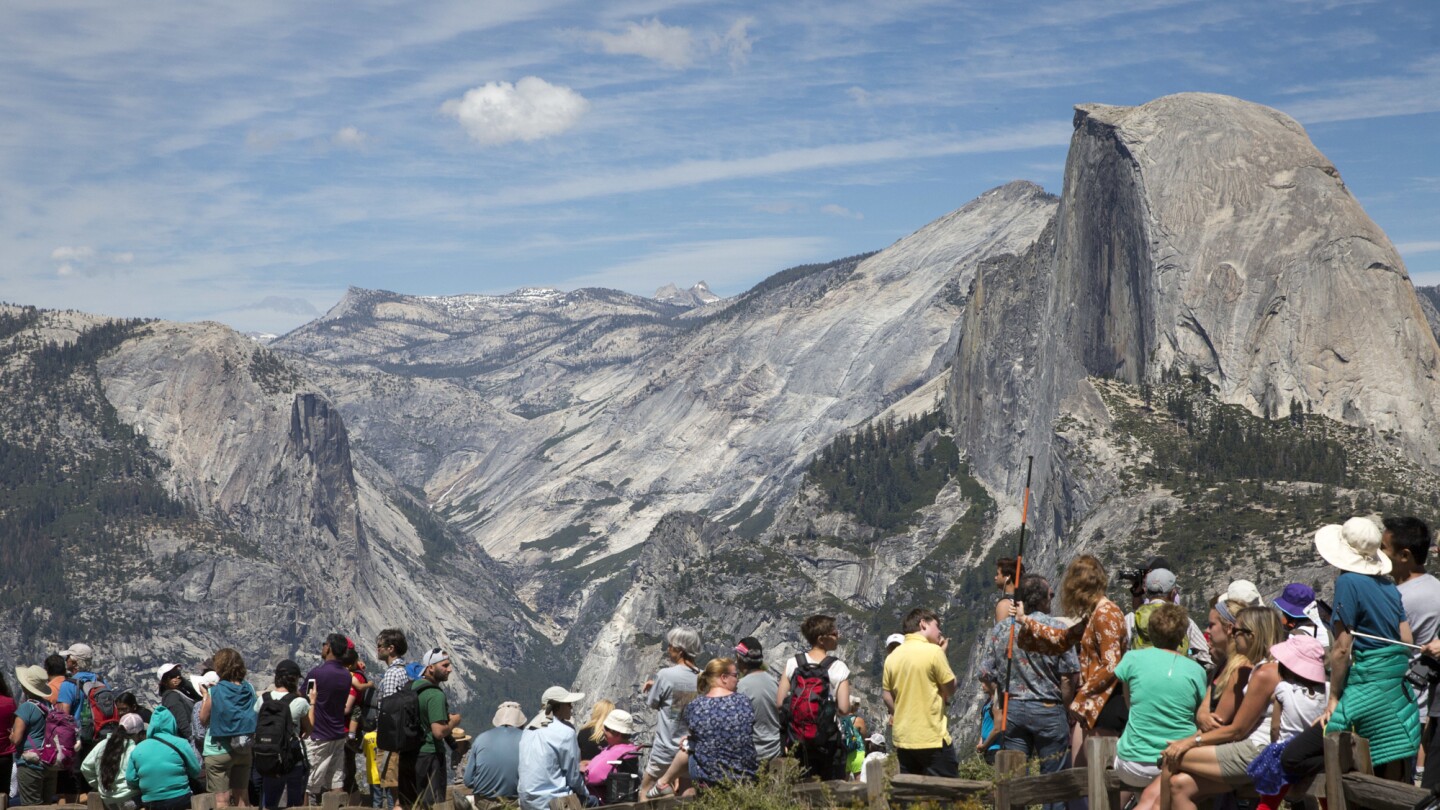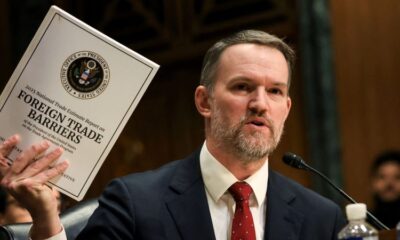Lifestyle
Brown University to see half a billion in federal funding halted by Trump administration

WASHINGTON (AP) — The Trump administration is planning to halt more than half a billion dollars in contracts and grants awarded to Brown University, adding to a list of Ivy League colleges that have had their federal money threatened as a result of their responses to antisemitism, a White House official said Thursday.
Nearly $510 million in federal contracts and grants are on the line, said the official, who was not authorized to speak publicly about the plan and spoke on condition of anonymity.
In an email Thursday to campus leaders, Brown Provost Frank Doyle said the university was aware of “troubling rumors” about government action on its research money. “At this moment, we have no information to substantiate any of these rumors,” Doyle said.
Brown would be the fifth Ivy League college targeted by President Donald Trump’s administration, which is using federal money to enforce its agenda at colleges. Dozens of universities — including every Ivy League school except Penn and Dartmouth — are facing federal investigations into antisemitism following a wave of pro-Palestinian protests last year.
Columbia University was the first one targeted, losing $400 million in federal money with threats to terminate more if it didn’t make the campus safer for Jewish students. The school agreed to several demands from the government last month, including an overhaul of student discipline rules and a review of the school’s Middle East studies department.
The government later suspended about $175 million in federal funding for the University of Pennsylvania over a transgender swimmer who previously competed for the school. On Monday, a federal antisemitism task force said it was reviewing almost $9 billion in federal grants and contracts at Harvard University amid an investigation into campus antisemitism.
And on Tuesday, Princeton University said the administration had halted dozens of its research grants.
The pressure has created a dilemma for U.S. colleges, which rely on federal research funding as a major source of revenue.
Trump’s administration has promised a more aggressive approach against campus antisemitism, accusing former President Joe Biden of letting schools off the hook. It has opened new investigations at colleges and detained and deported several foreign students with ties to pro-Palestinian protests. An incoming assistant professor of medicine at Brown was deported to Lebanon last month for having “openly admitted” to supporting a Hezbollah leader and attending his funeral, the Department of Homeland Security said.
During last school year’s campus protests against the Israel-Hamas war, Brown stood out for a deal it struck with student activists. In exchange for the students’ dismantling an encampment, the university committed to having its governing board vote on whether to divest from companies that protesters said were facilitating Israeli occupation of Palestinian territories.
The Corporation of Brown rejected the divestment proposal.
___
AP Education Writer Collin Binkley contributed. Mumphrey reported from Phoenix.
___
The Associated Press’ education coverage receives financial support from multiple private foundations. AP is solely responsible for all content. Find AP’s standards for working with philanthropies, a list of supporters and funded coverage areas at AP.org.
Lifestyle
This federal rule helped clear air over America’s most beloved parks. Trump’s EPA wants to kill it

During a hike in the Great Smoky Mountains National Park in 1995, Don Barger climbed Chilhowee Mountain hoping to gaze across the valley below. All he saw was a wall of gray haze.
Today, he said, he can see some 50 miles (80 kilometers) across that same valley to the Cumberland Mountains.
A 26-year-old federal regulation known as the regional haze rule has helped cut down on pollution over national parks, wilderness areas and tribal reservations, restoring some of the nation’s most spectacular natural vistas for outdoor lovers like Barger. But conservationists fear those gains may be lost after President Donald Trump’s administration announced in March the rule is among dozens of landmark environmental regulations that it plans to roll back.
“It means a promise that was made to the American public is lost,” Barger, 74, said. “More and more generations of people are going to grow up as ignorant as I was, not realizing what I’m missing and not seeing.”
Congress pushes to clean air over parks, wilderness areas
Haze forms when small particles of air pollution, such as sulfur dioxide or nitrogen oxides, scatter and absorb sunlight, blurring views and decreasing visibility.
Congress amended the Clean Air Act in 1977 to make restoring and maintaining visibility a goal for 156 national parks, wilderness areas, wildlife refuges and tribal reservations across 36 states. That includes places like the Great Smoky Mountains National Park in North Carolina and Tennessee; Grand Canyon National Park; Glacier National Park; and the Boundary Waters Canoe Area Wilderness.
After years of drafting and litigation, the U.S. Environmental Protection Agency adopted regulations known as the regional haze rule in 1999 to implement the amendments.
The rule calls for attaining natural visibility conditions by the year 2064 and mandates that states come up with plans that include limitations on emissions, compliance schedules and monitoring strategies. Older facilities that emit pollution, such as coal-fired power plants, must adopt mitigation technology such as scrubbers or shut down periodically to decrease overall annual emissions.
A work in progress
The states’ plans have been plagued with delays as the EPA approves parts of them and rejects others. For example, two big oil- and coal-producing states, North Dakota and Wyoming, and industry groups filed petitions in federal court in January seeking review of EPA decisions rejecting their plans, according to the Harvard Law School’s Environmental and Energy Law Program.
The rule works in conjunction with other federal antipollution regulations, but it’s been crucial in clearing the skies over national parks and wilderness areas.
An Associated Press analysis of data from a nationwide network of monitoring sites from 1999, when the rule was implemented, through 2023 shows 93% of the parks and wilderness areas have seen improved air quality on clear days. No parks or wilderness areas have seen any notable worsening in visibility.
Visibility in the Great Smoky Mountains National Park was twice as good on a typical clear day in 2023 as it was in 1999, marking the biggest improvement among the national parks.
The EPA estimates that between 2007 and 2018 the rule has cut 500,000 tons of sulfur dioxide and 300,000 tons of nitrous oxides annually. The average visual range has increased from 90 miles to 120 miles (144 kilometers to 193 kilometers) in some western parks and from 50 to 70 miles (80 kilometers to 112 kilometers) in some eastern parks, according to the Harvard program.
‘Most consequential day of deregulation’
Trump’s EPA administrator, Lee Zeldin, announced March 12 that the agency would look to roll back 31 landmark environmental regulations, including the regional haze rule. Zeldin called the announcement the “most consequential day of deregulation in American history” and said in an essay published in the Wall Street Journal that the administration is “driving a dagger through the heart of climate-change religion.”
Asked for comment on the regional haze rule, the EPA said they want to better account for pollution from outside the U.S. and from natural sources and avoid unnecessary burdens for states and industry.
Has the rule hurt energy producers?
In a cost-benefit analysis of the rule before it took effect, the EPA found it would cost energy producers up to $98 billion by 2025 while providing about $344 billion in benefits such as health care savings.
Producers argue that the haze rule has done its job and it doesn’t make sense to continue to impose costs on them.
“This is a matter of diminishing returns,” said Jonathan Fortner, interim president and CEO of the Lignite Energy Council, which advocates for North Dakota’s coal industry. “The air is clean, the data proves it, and the science backs that up. The rule’s being misapplied, not because we disagree with clean air goals, but because we’re already there.”
Two federal properties in North Dakota are subject to the rule, the Lostwood National Wildlife Refuge and Theodore Roosevelt National Park. The AP analysis found both sites have seen dramatic visibility improvements over the five years from 2019 to 2023.
EPA officials did not respond to an AP request for a list of power plants that have closed due to the regional haze rule. A number of energy industry groups did not return repeated requests for comment, including the U.S. Energy Association and the National Utility Contractors Association.
What’s next for the parks?
Advocates of the rule say eliminating it could lead to reduced tourism and the economic boom visitors bring to national park regions. The National Park Service estimates 325 million people visited national parks in 2023, spending $26.4 billion in gateway communities.
Nothing appears likely to change overnight. Conservationists expect the Trump administration to pursue a rollback through language revisions in the rule, a process that would require a public comment period and would likely trigger court challenges that could last years.
“I’ve watched the Great Smoky Mountains National Park emerge from the chemical haze that once enshrouded it and was getting worse,” Barger said. “It’s just this visceral sense of place. We had lost it entirely. The Clean Air Act is working and it’s a work in progress. You have to stay with it or it doesn’t work.”
___
Associated Press Science Writer Seth Borenstein contributed to this report.
___
The Associated Press’ climate and environmental coverage receives financial support from multiple private foundations. AP is solely responsible for all content. Find AP’s standards for working with philanthropies, a list of supporters and funded coverage areas at AP.org.
Lifestyle
Prada agrees to buy rival fashion house Versace in a deal valued at $1.4 billion

ROME (AP) — The Prada Group announced a deal Thursday to buy Italy’s Versace from the U.S. luxury group Capri Holdings under terms that value the fashion house at 1.25 billion euros ($1.4 billion).
Prada said the addition of Versace’s “highly recognizable aesthetic … constitutes a strongly complementary addition” to its portfolio, which includes the Prada and Miu Miu fashion brands. It said Milan-based Versace offered “significant untapped growth potential.’’
The final value of the deal will be adjusted at closing, expected in the second half of the year. It will be funded by 1.5 billion euros in new debt and has been approved by the Prada and Capri Holdings board of directors.
“Versace will maintain its creative DNA and cultural authenticity, while benefitting from the full strength of the Group’s considerable consolidated platform, including industrial capabilities, retail execution and operational expertise,’’ Prada said in a statement.
Versace, founded in 1978 by the late Gianni Versace, has been owned since 2018 by Capri Holdings, which includes Michael Kors and Jimmy Choo.
Capri Holdings paid $2 billion for Versace, but had been struggling in the recent era of “quiet luxury’’ to position the stalwart of Italian fashion with its sexy silhouettes and loud patterns.
Last month, Capri Holdings named Dario Vitale as creative director to replace Donatella Versace, who assumed the role after her brother’s 1997 murder. Vitale came from Miu Miu, the stunningly successful youth-driven brand in the Prada Group.
Versace was given the new role of chief brand ambassador in the shakeup, which was widely viewed as setting the scene for the long-rumored Prada sale. Miuccia Prada acknowledged the group’s interest on the sidelines of Milan Fashion Week in February.
Lifestyle
One Tech Tip: Locking down your device when crossing borders

LONDON (AP) — Planning an international trip? Travelers should prepare for the possibility of extra scrutiny of their phones when crossing borders, especially when entering the United States.
The Canadian government warned travelers in a recent travel advisory that U.S. border agents are entitled to search your electronic devices and “don’t need to provide a reason when requesting a password to open your device.”
Some recent cases have made travelers nervous about their privacy, such as when a Brown University professor with a U.S. visa was deported to Lebanon after border agents found a photo of Hezbollah’s leader on her phone.
“While 100% privacy may be impossible in these situations, there are a few things you can easily do that make it much harder for someone to see your private data even with physical access to your device,” said Patricia Egger, head of security at encrypted service Proton Mail.
Here are tips on protecting your device privacy while travelling:
What should I do before I set off?
Experts say the best strategy is to reduce the amount of information you’re carrying while traveling.
If possible, leave your phone at home. If you need one on your trip, borrow a tactic used by corporate executives looking to avoid hackers: get a temporary or “burner” device. It can contain just the information you need for your trip. Download anything else from the cloud when you need it.
If you have to bring your phone or laptop, upload sensitive information to a cloud storage service that uses end-to-end encryption, then delete the originals from your device.
Also, encrypt your phone or laptop’s storage drive and protect it with a strong password. Be aware this is different from merely having a device passcode lock, which is more easily cracked, or the end-to-end encryption on your favorite communication platforms.
Turn off fingerprint or facial recognition features and use the PIN or passcode instead.
What kind of search will be done at borders?
There are two kinds of searches, according to the U.S. Customs and Border Protection website.
In a basic search, an officer scrolls through your phone’s photos, emails, apps and files. No suspicion of wrongdoing is needed to conduct this type of search.
In an advanced search, the contents of your device could be copied for analysis. But a senior manager needs to sign off and there needs to be “reasonable suspicion” of a legal violation, except if there’s any concern for national security, according to the Electronic Frontier Foundation (EFF).
Who’s at risk of getting searched and what are they looking for?
“It’s hard to say,” says Sophia Cope, senior staff attorney at the EFF, which offers an extensive online guide to border privacy. Warrants are not needed to inspect devices belonging to anyone entering the country.
U.S. Customs and Border Protection agents carried out a total of more than 47,000 electronic device searches last year, up tenfold from a decade ago.
Basic searches “can be for no reason at all, totally random, or based on a mere hunch about someone – maybe based on how they look or an answer they gave to a preliminary question,” said Cope.
Travel history can also be relevant, for example, if a traveler originates from someplace where terrorism, drug trafficking, or child sex tourism is common, she said. Border agents can also search devices “at the behest” of other agencies like the FBI or if they’re associated with someone else of interest, such as a journalist’s source, a business associate or a family member.
What should I do when I get to the border?
Best to power off your devices when you touch down.
Under current policy, U.S. border agents are only allowed to look at information stored on the device, and not anything that’s kept in the cloud. So if you have to leave your phone on, make sure it’s kept in airplane mode or otherwise disconnected from the internet by Wi-Fi or cellular data.
“Before crossing the border, put your device in airplane mode to ensure remote files don’t get downloaded accidentally,” the Canadian government warns.
But keep in mind there might be cached data that still remains on your phone, such as files in the trash that haven’t been emptied.
What if I refuse?
American citizens can’t be denied entry to the United States for refusing to consent to device searches. The same should apply to lawful permanent residents such as green card holders, the American Civil Liberties Union says.
But agents can make things difficult if they’re refused. Travelers could be questioned, detained temporarily or have their devices seized and not returned for days or even weeks, rights groups say.
Foreign travelers could be turned back if they say no.
If you’re forced to unlock your device, Egger advises that “where you can, log in yourself rather than divulging any PINs or passwords, and if forced to share passwords, change them as soon as you can.”
Experts say the reason you should not use your device’s fingerprint or facial recognition feature is that it’s easier to compel you to unlock your device with biometrics. A border agent could simply hold your phone up to your face or force you to press your finger onto your device. There are also fears that police could use fingerprints stored on government databases.
Powering off your devices is another way to protect against sophisticated attacks in case you don’t consent to a search.
Most modern phones and some laptops encrypt their data using a strong cryptographic keys only accessible when the user unlocks it with the passcode, said Will Greenberg, the EFF’s senior staff technologist.
If the device is locked but not turned off, the key remains loaded on the device’s memory. Powerful hacking tools made by companies like Cellebrite can recover the key and decipher the data.
But if the device is off, the key is unloaded and can’t be accessed until it’s turned on again and unlocked with the passcode.
“This is why a border agent can’t simply turn a device on to use a tool like Cellebrite,” Greenberg said.
What about social media?
To be on the safe side, delete your social media apps and reinstall them later. Even though content is mainly stored on a social media company’s servers, Cope says some posts or images might remain on your phone’s memory cache and therefore viewable even in airplane mode.
What else can be searched?
It’s not just phones and laptops. Digital cameras, smartwatches, tablets, external hard drives and other electronic devices can be searched.
What not to do?
Some tactics might backfire. If you’re tempted to completely wipe your phone or laptop hard drive before you travel, experts warn it could raise scrutiny.
“If detected by a border agent, the fact that you wiped your hard drive may prompt the agent to ask why you did so,” the EFF’s guide says. “Even traveling without devices or data that most travelers typically have could attract suspicion and questions.”
Also don’t try to hide information on your device, because border agents could find out, the group says. “Lying to border agents can be a serious crime, and the agents may take a very broad view of what constitutes lying,” it says.
What about other destinations?
Check local laws of your destination before you travel. For example, Britain’s counterterrorism law allows police to demand that people passing through the country’s border hand over devices along with passwords and PINs. If they refuse, they can be charged with terrorism.
___
Is there a tech topic that you think needs explaining? Write to us at [email protected] with your suggestions for future editions of One Tech Tip.
-

 Education2 days ago
Education2 days agoDemocratic-led cities and states push back on threats to cut US school funding over DEI
-

 Sports1 day ago
Sports1 day agoJason Day will opt for ‘toned down’ Masters outfit as organizers check what he plans to wear at the tournament
-

 Lifestyle1 day ago
Lifestyle1 day agoWater bottles have an array of new designs and functions
-

 Middle East23 hours ago
Middle East23 hours agoAt least 35 killed in Israeli attack on Gaza residential block | Israel-Palestine conflict News
-

 Sports24 hours ago
Sports24 hours agoAurélio Pereira: Cristiano Ronaldo pays tribute as legendary Portuguese coach who scouted him dies aged 77
-

 Middle East1 day ago
Middle East1 day agoEight charts that reveal the economic impact of Trump’s tariffs | Donald Trump News
-

 Europe1 day ago
Europe1 day agoTrump’s top trade official says president’s tariffs are necessary to fix trade deficit ‘emergency’
-

 Conflict Zones1 day ago
Conflict Zones1 day agoChinese soldiers in Ukraine: Is Beijing sending troops to back Russia? | Russia-Ukraine war News



